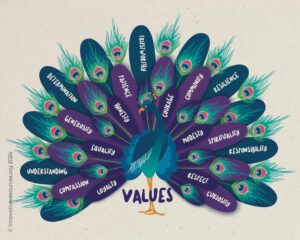Just the other day, I was talking to a social worker who was trying to access support for a person experiencing a serious mental health crisis. She’d tried different programs within her service (which was not focussed on mental health) and all the local mental health services, including crisis services, only to be turned away and told they were overstretched and unable to help.
Sitting with the person, with whom she had built trust and rapport, she felt powerless and compromised. She was concerned that if the person left, they may harm themselves, but she was unable provide the support she knew they needed.
Even though this was not her fault, she felt responsible. She also felt a sense of betrayal, that she was betraying the client’s trust, and the system was betraying them both.
I could also see that she was carrying the stress and concern with her, even when she wasn’t at work.
When I asked her if this was a common experience for social workers, she said it happened pretty regularly.
While we often talk about things like burnout, compassion fatigue, mental health, and vicarious trauma, we often don’t talk about how being forced to act in ways that don’t align with our values can significantly impact on our health, wellbeing and sense of identity.
what is moral injury?
The term ‘moral injury’ was first coined by psychiatrist, Jonathan Shay, while working with Vietnam veterans in the 1980s. He noticed that while many veterans experienced trauma, despair, or PTSD, their symptoms appeared to be worse if they felt they had been complicit in actions or events that went against their values. The shame or guilt they felt exacerbated their symptoms and made it more difficult for them to recover.
PTSD, their symptoms appeared to be worse if they felt they had been complicit in actions or events that went against their values. The shame or guilt they felt exacerbated their symptoms and made it more difficult for them to recover.
As The Ethics Centre describes:
‘Shay saw that these veterans were not just traumatised by what had happened to them, they were ‘wounded’ by what they had done to others. He called this new condition “moral injury,” describing it as a “soul wound inflicted by doing something that violates one’s own ethics, ideals, or attachments”.’
Moral injury involves specific experiences—often involving moral transgressions, either perpetrated or witnessed—and can lead to lasting psychological harm. It is a betrayal of a person’s moral code, either by themselves or others.
While this term is still most commonly used in military contexts, it is increasingly being talked about in other fields like social work, counselling, education and health.
Writing in The Conversation about moral injury in the education system, Glenys Oberg says:
‘…studies on moral injury in schools have shown how rigid disciplinary policies, high-stakes testing regimes and chronic underfunding often force teachers to act in ways that contradict their professional judgement. This can lead to frustration, guilt and professional disillusionment.
‘Recent studies have reframed moral injury as a systemic issue rather than an individual psychological condition. This is because institutional constraints—such as inflexible accountability measures and bureaucratic inefficiencies—prevent teachers from fulfilling their ethical responsibilities.’
In a study coming out of the School of Social Work, University of Texas, about the impact of moral injury on medical social workers, they found that, ‘… encounters of potentially moral injurious events (PMIEs) may result in longstanding psychological trauma that impact healthcare workers’ mental health and wellbeing.’
how is moral injury different from burnout?
Moral injury may be mistaken for stress, burnout, or compassion fatigue, and although there can be some crossover, experts agree that moral injury is distinct. People can experience stress, burnout, or compassion fatigue without compromising their values, identity or beliefs.
 Moral injury is also different from other forms of distress because it impacts on a person’s sense of identity. Professionals in fields like social work, psychology, health, and education often derive their sense of purpose and self-worth from their ability to help others. When they face ethical conflicts, it threatens not just their professional integrity, but their personal identity as well. This clash can lead to a crisis of self, as individuals begin to question their core values, competence, and worth.
Moral injury is also different from other forms of distress because it impacts on a person’s sense of identity. Professionals in fields like social work, psychology, health, and education often derive their sense of purpose and self-worth from their ability to help others. When they face ethical conflicts, it threatens not just their professional integrity, but their personal identity as well. This clash can lead to a crisis of self, as individuals begin to question their core values, competence, and worth.
This compromising of identity or moral coherence can feel like an existential trauma.
Given that moral injury is about a violation of a person’s deeply held values and beliefs, people may eventually feel like they are inherently bad people with a profoundly corrupted sense of identity.
The symptoms of moral injury often include things like guilt, shame, anxiety, depression, disconnection, erosion of sense of self and personal identity, and alienation from job, family, or community. As these symptoms can be similar to those of burnout, it is important to explore the causes of the symptoms in nuanced and curious ways, to identify if moral injury is a contributing factor.
what does moral injury look like in practical terms?
Whenever we are working with individuals or groups of people, we are often working from a set of values or principles. If we are working from a strengths-based perspective, for example, we might believe:
- Everybody deserves to be treated with respect and dignity.
- Everyone has strengths, skills and wisdom.
- The problem is the problem; the person is not the problem.
- Every person has a right to have their basic needs met.
- People are doing the best they can with the resources and knowledge they have.
- Every person should have access to quality food, housing, education and healthcare.
- Every person has the right to feel safe.
If we hold these values, we may feel compromised if we are made to act in ways that don’t align with what we believe.
This might take the form of things like:
- Not being able to provide housing for a family experiencing homelessness when you know they are desperate and have no other options.
- Having to deny people medical care as you have limited resources, or only being able to give care to patients who can pay.
- Offering a service to one person experiencing suicidal thoughts over another as there aren’t enough beds.
- Having to complete forms or ask for personal information when you know the person is needing you to be present.
- Having to spend time completing paperwork rather than being with students, clients or patients.
- Witnessing systems or institutional structures that perpetuate or increase trauma, shame, or harm.
- Not following up with a student you know is experiencing difficulties at home because you simply don’t have time.
- Supporting someone who has committed acts that have harmed others.
- Witnessing practices that marginalise or exclude certain people within your organisation but not feeling like you can do anything about it.
- Having to report a family you’ve been working with for a long time to child protection, knowing they may have their children removed (knowing also, that this may cause additional trauma).
- Having to teach a one-size-fits-all curriculum, knowing that this will not work for many of your students.
- Witnessing violence or abuse, but not being able to intervene as it’s beyond your job role.
- Making students who are neurodivergent take tests designed for neurotypical students, knowing the results will be unfair and inaccurate, and some students will be alienated from education as a consequence.
Events leading to moral injury may be one-off circumstances, or they may be an accumulation of small events that happen over time.
how to address moral injury
To combat moral injury, it’s essential to understand that healing does not just involve emotional support, but also the reconstruction of moral identity.
Here are a few ideas for how you can explore moral injury in a meaningful way:
- Naming – create safe spaces where you can openly discuss moral conflicts without people fearing judgment or reprisals. This may be in supervision, peer supervision, in teams, counselling, or even with friends or family. Reflection allows individuals to integrate their feelings of guilt or shame into a larger understanding of their role and responsibility. It is also important to acknowledge what is within your control to change and what isn’t.
- Acknowledgement – be aware that sometimes our teams or organisations may have become desensitised to moral injury. This may manifest in the normalising or justification of behaviours or practices that are ethically questionable. Sometimes this has become a culture in a team over time or sometimes it results from people trying to deal with the reality that they are under-resourced. Challenging your team or colleagues to think differently, or ask deeper questions, may feel confronting or uncomfortable but it can also be empowering. You might find other team members have been sitting with the same concerns.
- Reconnect with your values – moral injury can feel all-encompassing, like your whole being has been compromised. But this is rarely the case. Chances are, there are very specific circumstances where you’re feeling morally compromised. By identifying your values and exploring the specific instances you felt compromised, you can then consider if there are any solutions or changes you can make that allow you to continue working in a way that you feel is ethical. If the sense of moral injury has become debilitating, you may require professional support like counselling or external supervision.
- Parallel practice – many organisations now have a set of guiding values designed to direct the work of the organisation at all levels. Building in regular opportunities for staff to reflect upon where their work aligns with organisational, and personal, values can help to identify places where policies, processes and practices don’t align and therefore increases the likelihood of moral injury. These can then be addressed at a systemic level. Moral injury can also be reduced if people believe their concerns are being taken seriously and change is likely, so it’s important to build in an action-reflection process to ensure people know their concerns are being acted upon.
- Professional development – as moral injury is a relatively new concept in human services work, it may be valuable to organise some professional development or reflective practice sessions to understand what moral injury looks like for you and your workplace. The benefit of doing this collectively is that you can also start to explore potential solutions as a team or group. Make sure you spend time exploring how you can stay aligned to your values, even when things are tough. It is also important to talk about strategies for navigating challenging ethical terrain.
- Understanding the broader context – moral injury isn’t just an individual issue; it reflects broader societal problems. It can be viewed as a symptom of an imperfect system—one where systemic inequalities, inadequate resources, and bureaucratic constraints force people to act in ways that are contrary to their beliefs. Addressing moral injury also means looking critically at the structural issues that create these ethical dilemmas in the first place.
Have you experienced moral injury? We’d love to hear your insights or reflections.
by Dr Sue King-Smith
Relevant card sets

